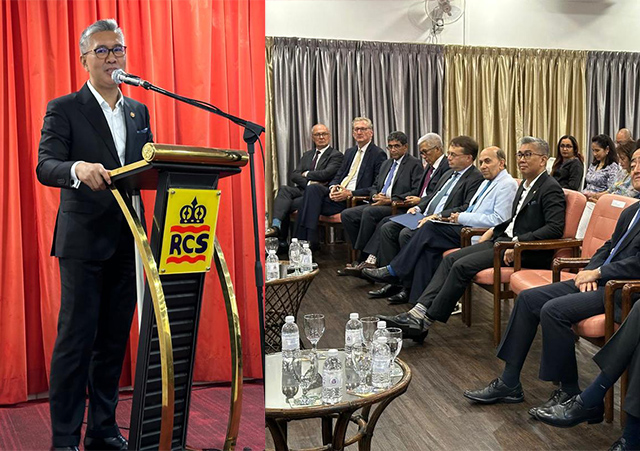 Tengku Abdul Aziz (l) and audience.
Tengku Abdul Aziz (l) and audience.
The Malaysian chapter of The Round Table co-organised an event which discussed the opportunities, challenges and implications of Malaysia’s upcoming chairmanship of the Association of Southeast Asian Nations (ASEAN) in 2025.
The event, which was held jointly with the Royal Commonwealth Society Malaysia (RCSM) and the ASEAN Business Club (ABC), included a keynote speech by the Malaysia’s Minister for Investment, Trade and Investment (MITI), Tengku Zafrul Tengku Abdul Aziz, and a panel discussion which had as participants: the Chief Executive Officer of Malaysian Investment Bank, Dato’ Fad’l Mohamed; the Ambassador of Japan to Malaysia, His Excellency Katsuhiko Takahashi; the Ambassador of the United States to Malaysia, His Excellency Edgard D. Kagan, and the President of the ASEAN Business Club, Tan Sri Munir Majid (who is also a member of the International Advisory Board of The Round Table).
In attendance were also many other High Commissioners, Ambassadors and members of the diplomatic corps based in Kuala Lumpur. The event attracted significant media attention too.
Minister Abdul Aziz began his address by underlining the importance of showcasing Malaysia’s capabilities and leadership at the international level and “aiming to exceed our deliverables during the ASEAN Chairmanship”. Malaysia’s efforts will, he said, include “examining global geopolitical sentiments, megatrends, and key dynamic elements within ASEAN such as demographic changes, sustainability achievements, innovation rates, and connectivity gaps”.
Malaysia had, said Tengku Aziz, a number of Priority Economic Deliverables (PEDs), crafted by his Ministry and these were framed around four strategic thrusts, viz, enhancing trade and investment between ASEAN Member States; integrating and connecting economies in the region; forging an Inclusive and sustainable future; and transforming for the Digital Future.
He identified three global megatrends which were, in his opinion, particularly relevant: de-risking or even de-globalisation, the race to net-zero in climate terms and the world’s unstoppable journey towards an AI-driven operating landscape. The ASEAN Digital Economy, he noted, is expected to grow up to three times its present status, reaching US$1 trillion by 2030.
The Minister averred that “ASEAN has the potential to become the epicentre of the next phase of growth in the Global South. Many ASEAN Dialogue Partners, including India, China, the EU, and the US, are revising their outlook and commitment to strengthen or expand trade and investment ties with ASEAN, particularly in emerging areas of growth. Countries such as Canada, the Gulf Cooperation Council (GCC), and Switzerland are also seeking to fortify their economic ties with ASEAN.”
Many of the themes in the keynote address were explored at length in the panel discussion which followed. There was also a lively question and answer session in which members of the audience, representing various sectors of Malaysian society, participated. The Editor of The Round Table: The Commonwealth Journal of International Affairs, Dr Venkat Iyer, delivered a welcome address in which he outlined the history and evolution of the journal and invited contributions in the form of articles and opinion pieces on themes and issues connected with, or having a relevance to, the Commonwealth. Particular thanks were extended to Ms Bernice Narayanan, President of RCSM, who played a vital role in the organisation of the event.
Venkat Iyer is the editor of The Round Table: The Commonwealth Journal of International Affairs.



